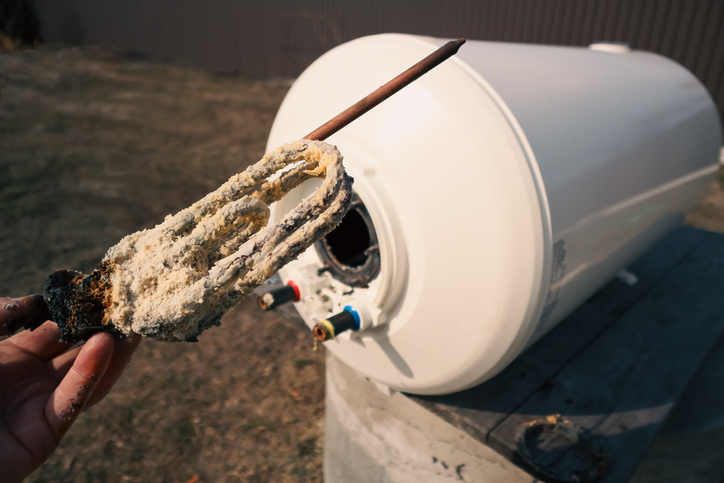- Home
- How to
- How to
- Services
- Services
- Maintenance Plan
- Location
- Guides
- Guides
- No Hot Water – Self help
- Unvented Water Heater
- Unvented Water Heater Faults
- G3 Building Regulations
- Thermal Store Water Heaters
- Thermal Store Faults
- Gledhill ElectraMate
- Gledhill PulsaCoil
- Gledhill Torrent
- Gledhill Stainless Lite
- OSO Unvented Heater
- MegaFlo – Heatrae Sadia
- Santon Premier Plus
- Albion
- Manco Riverstream and Powerstream
- Manco Gladiator & Stirling
- Telford Tempest
- Safety Considerations Unvented Cylinders
- Reduce Your Water Heating Bill
- Range Tribune
- About Us
- About us
- Forum
- Contact

-
Call Now
Specialists in Electric Hot Water Cylinders
How Hard Water Silently Damages Your Unvented Cylinder (and What to Do About It)
If you live in a hard water area (which is much of the UK), you already know about kettle scale and cloudy glassware. However, what you might not realise is that the same mineral build-up is quietly forming inside your hot water system, and fixing that is far more expensive than replacing a kettle.
Your unvented cylinder is designed for reliability and efficiency, but limescale will slowly and silently destroy it. Over time, lime deposits reduce performance, waste energy, and could even leave you facing a “no hot water” emergency.
Why Hard Water Is a Problem
Hard water is rich in dissolved calcium and magnesium. When it’s heated, these minerals precipitate out as solid limescale. Inside an unvented cylinder, that scale clings to heating elements, valves, and pipework.
The hotter the water, the faster the build-up and the greater the strain on your system.
How Limescale Damages Key Components
Limescale might not seem like a big danger, but inside your unvented cylinder, it can cause some pretty serious damage. That includes:
1. Heating Elements
In direct or electric-only systems, limescale coats immersion heaters in a thick layer. This forces them to work harder and longer to heat water, raising your energy bill and making it more likely that they’ll fail early.
2. Blending (Mixing) Valves
Scale can clog the moving parts inside blending valves, stopping them from mixing water correctly. The result? You’ll get lukewarm water at best, or no hot water at all.
3. Combination Valves and Filters
Limescale and mineral debris can block the fine mesh filters inside your combination valve, slowing down the flow of water into the cylinder and increasing refill times.
4. Pressure Control Components
Scale deposits on valve seats and seals can prevent them from closing fully, leading to water discharge through the tundish and constant reheating cycles.
The Hidden Costs of Limescale
Limescale damage isn’t just mechanical. It also affects your finances in a few different ways:
-
Higher energy bills — Heating through a layer of scale costs more energy.
-
Frequent repairs — Scale-damaged valves and other components need replacement years ahead of schedule.
-
Reduced cylinder lifespan — Constantly working too hard and pressure fluctuations shorten the life of the whole cylinder.
How to Prevent Scale Build-Up
You can’t change your local water hardness, but you can protect your cylinder:
-
Install a scale reducer upstream of the cylinder to minimise mineral deposits.
-
Book annual servicing with EasyFlow (we’re G3-qualified engineers) to check and clean filters, descale blending valves, and test performance.
-
Lower your stored water temperature slightly. Keeping it in the safe range but not unnecessarily hot slows the rate of scale formation.
-
Act fast if you notice reduced flow, tundish drips, or temperature fluctuations because these can all be early signs of scale-related problems.
Don’t Let Hard Water Damage Your Unvented Cylinder
Hard water damage is slow but relentless. Left unchecked, limescale will quietly erode your cylinder’s efficiency, reliability, and lifespan. But with proactive steps and regular care, you can keep your hot water flowing, your bills under control, and your system working as it should for years to come.
Iain, Nantwich
13 October 2025
Annual Service
Excellent service as always.. Highly recommendable.
Peter , Nantwich
16 September 2025
Annual Service
Very pleased with all aspects of the work completed by your knowledgeable staff.
Barry, Royton
13 June 2025
Replacement Valves
Tom, Manchester
20 May 2025
Replacement Valves
Raymond, Lancashire
1 May 2025
Annual Service
Vickie, Didsbury
10 April 2025
Annual Service
Raymond, Reddish
17 March 2025
No Hot Water
Brenda , Liverpool
12 February 2025
Installation
Gianfranco, Uk
18 February 2025
Annual Service
As always the serrvice was done efficiently and the surrounding area left clean and tidy.
Anne, Manchester
30 January 2025
Annual Service

© 2026 EasyFlow Water Limited. All rights reserved








Find out what our clients are saying about the services we provide
Click to view